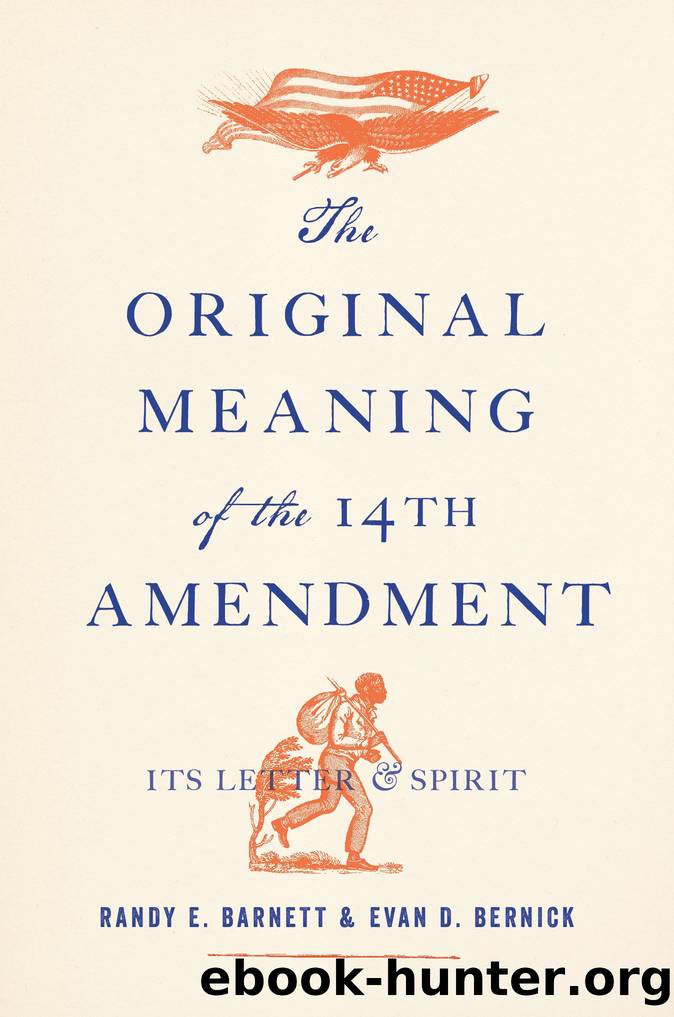The Original Meaning of the Fourteenth Amendment by Randy E. Barnett

Author:Randy E. Barnett
Language: eng
Format: epub
Publisher: Harvard University Press
Implementing Republican Citizenship
Unlike scholars, time-pressed, boundedly rational public officials cannot afford to engage in extensive historical and linguistic inquiries. Even if they could, they would still confront constitutional text that does not compel them to take one, and only one, course of action. Underdeterminacy is part of constitutional reality. Accordingly, they need a set of doctrinal tools that economize on time and cognitive effort and simplify constitutional decision-making. Such constitutional heuristics are the stuff of which constitutional doctrine is made. What doctrines best enable decision-makers to implement the Privileges or Immunities Clause in a manner that is faithful to its letter and spirit?
As we will explain in Part II, we reject the view of those who, like Justice Clarence Thomas, contend that the Due Process of Law Clause imposes no limits on the content or substance of legislation.30 But we share with Justice Thomas the view that the business of identifying âfundamentalâ or substantive rights of citizens that states are obliged to respect should be performed under the Privileges or Immunities Clause. This can be confusing. Carefully distinguishing between the work done by the Privileges or Immunities Clause and the Due Process of Law Clause can help, which requires us to preview what is forthcoming.
As we will show in Part II, the âdue process of lawâ includes a guarantee of a judicial process in which the substance of legislation is evaluated to ensure that it is within the proper power of the legislature to enact. As we have shown in Part I, a legislative act is improper if it abridges the substantive rights to which the Privileges or Immunities Clause refers. Put another way, the Privileges or Immunities Clause provides a restriction on state legislative powerââno state shall make or enforce any lawââbased on the substantive rights, âprivileges or immunitiesâ enjoyed by all citizens. In contrast, the Due Process of Law Clause provides a procedure in which the substance of legislation is evaluated by the judiciary to ensure that a statute has not violated these privileges or immunities.31
The modern concept of âsubstantive due processâ confusingly collapses these two substantive inquiries: (a) the judicial identification of substantive rights and (b) the judicial evaluation of the substance of legislation. We think that the original meaning of the Privileges or Immunities Clause authorizes and constrains the former and that the original meaning of the Due Process of Law Clause authorizes and constrains the latter.
At present, however, the Supreme Court identifies substantive rights under the rubric of the Due Process of Law Clause. To identify these fundamental rights, the Court generallyâalthough not exclusivelyârelies on a two-pronged heuristic described in the âright to dieâ case of Washington v. Glucksberg32: a substantive right will be deemed fundamental only if it is found by the Court to be âdeeply rooted in this Nationâs history and traditionâ33 and given a âcareful description.â34
Considering how harshly one of us has criticized this âGlucksberg two-step,â35 it may surprise some to learn that our proposed approach to identifying the unenumerated privileges and immunities of US citizenship closely resembles Glucksberg.
Download
This site does not store any files on its server. We only index and link to content provided by other sites. Please contact the content providers to delete copyright contents if any and email us, we'll remove relevant links or contents immediately.
| Africa | Americas |
| Arctic & Antarctica | Asia |
| Australia & Oceania | Europe |
| Middle East | Russia |
| United States | World |
| Ancient Civilizations | Military |
| Historical Study & Educational Resources |
Never by Ken Follett(2867)
The Man Who Died Twice by Richard Osman(2289)
Machine Learning at Scale with H2O by Gregory Keys | David Whiting(2261)
Fairy Tale by Stephen King(2058)
Will by Will Smith(2030)
Rationality by Steven Pinker(1759)
The Dawn of Everything: A New History of Humanity by David Graeber & David Wengrow(1563)
The Dark Hours by Michael Connelly(1561)
Principles for Dealing With the Changing World Order: Why Nations Succeed and Fail by Ray Dalio(1368)
Friends, Lovers, and the Big Terrible Thing by Matthew Perry(1318)
A Short History of War by Jeremy Black(1295)
HBR's 10 Must Reads 2022 by Harvard Business Review(1251)
Go Tell the Bees That I Am Gone by Diana Gabaldon(1231)
Can't Hurt Me: Master Your Mind and Defy the Odds - Clean Edition by David Goggins(1217)
515945210 by Unknown(1205)
Fear No Evil by James Patterson(1103)
443319537 by Unknown(1069)
Works by Richard Wright(1017)
Going There by Katie Couric(986)
